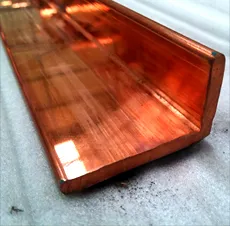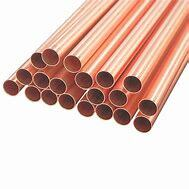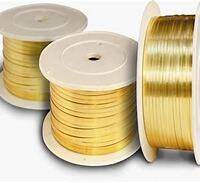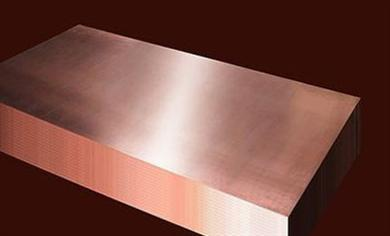1. Introduction
Copper prices hit a three-month high this week, driven by supply constraints and rising demand in renewable energy and EV infrastructure (as reported by Reuters on June 26, 2024). This surge makes understanding copper products—from rods to strips—not just a technical necessity but a financial imperative. Whether you’re installing an earthing system, welding copper components, or stripping wire for scrap, choosing the right form of copper can save time, money, and headaches.

In this guide, we’ll break down the key types of copper rod, compare their real-world performance, and clarify how they relate to other copper formats like strips, bars, and pipes. No fluff—just actionable insights for electricians, welders, recyclers, and engineers.
2. Copper Rod Varieties: Solid vs. Bonded vs. Clad
When people say ‘copper rod’ or ‘rod copper,’ they often assume it’s pure copper. But that’s not always the case—and the differences matter a lot depending on your application.
Solid copper rods are made from high-conductivity electrolytic-tough-pitch (ETP) copper. They’re ideal for electrical bus bars, welding, and high-corrosion environments. However, they’re expensive—driving interest in alternatives like copper bonded earthing rod and copper clad ground rod.
- Copper bonded earthing rod: A steel core electroplated with a thick layer of copper (typically 0.25mm+). Offers good conductivity and high tensile strength at lower cost. Commonly used in grounding systems.
- Copper clad steel earth rod: Similar concept, but uses metallurgical bonding. Slightly less copper coverage than bonded types but still effective for most earthing applications.
For grounding, both copper bonded and copper clad options perform well, but solid copper remains the gold standard in highly corrosive soils. Check earthing rod price listings—you’ll often find bonded rods 30–50% cheaper than solid equivalents.
3. Welding and Brazing: Not All Copper Rods Are Equal
Confusion often arises between copper welding rod and copper brazing rod. They serve different purposes:
Copper to copper welding rod (or welding rod copper) is used in true fusion welding, typically with TIG or MIG processes. It requires high heat and is best for joining thick copper sections in industrial settings.

Copper brazing rod, on the other hand, melts at lower temperatures and flows into joints via capillary action. Copper to copper brazing rods are widely used in HVAC and plumbing—especially when working with aircon copper pipe or copper pipe for AC systems.
Pro tip: For most DIY or field repairs, brazing is easier and more forgiving than welding. Always match the rod alloy to your base metal to avoid weak joints.
4. Copper Strips and Bars: The Flat-Sided Cousins of Rods
While copper rod is round, many applications need flat conductors. That’s where copper strip, flat copper strip, and copper flat bar come in.
Common uses include:
- Copper strip for earthing in substations
- Flexible copper bus bar in switchgear
- Copper roof strip for architectural detailing
- Nickel plated copper strip in electronics for corrosion resistance
You’ll see specs like ‘copper earth strip 25x3mm price’ or ‘1mm copper strip’—these refer to cross-sectional dimensions. Thinner strips (e.g., thin copper strips or copper strip roll) are used in transformers; thicker ones serve as grounding straps.
Recyclers often ask: ‘Is stripping copper wire worth it?’ Absolutely—if you use the best way to strip copper wire (mechanical strippers, not burning!). Burning copper wire for scrap damages the metal and is illegal in many areas. For scrap value, clean, bare copper from stripping wire for recycling fetches top dollar.
5. Pricing and Sourcing: What’s Driving Costs?

Copper rod price and copper strip price track the LME (London Metal Exchange) closely. As of late June 2024, prices hover near $9,800/ton—up 8% month-over-month.
Factors affecting your cost:
- Purity: ETP copper (C11000) costs more than alloys like beryllium copper strip
- Form: Round bar copper is often cheaper per kg than precision-cut strips
- Quantity: Buying a roll of copper strip or copper bars for sale in bulk reduces unit cost
Search terms like ‘copper strip near me’ or ‘copper bars for sale’ yield local suppliers, but always compare specs. A ‘copper clad steel ground rod’ might be labeled as ‘ground rod copper’—verify the copper thickness before buying.
6. Beyond Rods: How Copper Rod Relates to Pipes and Ingots
Don’t confuse copper rod with copper pipework. While both are made from similar alloys, copper tubing (like 15mm copper pipe or 22mm copper tube) is drawn for fluid transport, not electrical conduction.
Similarly, copper ingot is the raw material used to produce rods, bars, and strips. If you see ‘copper ingot price’ rising, expect downstream products like copper round bar or copper bus bar to follow.
Fun fact: The same ETP copper used in rod form also makes 1oz copper price benchmarks in electronics—showing how interconnected these markets are.
7. Conclusion
Choosing the right copper product starts with understanding your application. Need durability and conductivity underground? Go for solid copper earth rod or verify copper bonded steel specs. Welding copper components? Match your copper rod for welding to the base metal. Stripping wire for scrap? Skip the flame—use mechanical tools for clean, high-value copper strip.
With copper prices climbing and green tech demanding more conductive materials, knowing the difference between a copper clad earth rod and a true copper round bar isn’t just technical—it’s economic. Stay informed, compare specs, and never assume ‘copper’ means the same thing across products.
Our Website founded on October 17, 2012, is a high-tech enterprise committed to the research and development, production, processing, sales and technical services of ceramic relative materials such as Choose. Our products includes but not limited to Boron Carbide Ceramic Products, Boron Nitride Ceramic Products, Silicon Carbide Ceramic Products, Silicon Nitride Ceramic Products, Zirconium Dioxide Ceramic Products, etc. If you are interested, please feel free to contact us.

